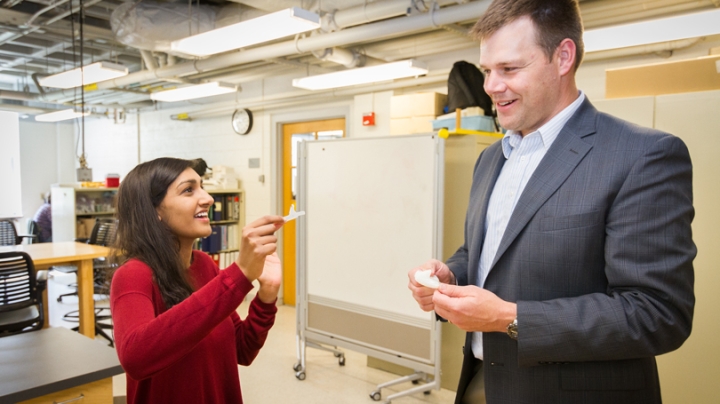Nivedita (Nivi) Nagaraj ’16 grew up in Michigan in a world of engineering. A computer science engineer mother and a mechanical engineer father were the inspiration for the undergraduate’s path of studies at Thayer School of Engineering.
“Dad does all the safety analysis of crash simulations for Ford Motor Company,” says Nagaraj. “Whenever I had a day off from school, I would go with him into the lab and watch him crash cars. It was super fun for me, and this set me off in the direction of engineering.
“I decided to come to Dartmouth because it was a small school,” she says. “I especially loved Thayer, as it was a small yet incredibly strong engineering program that focused on collaboration in and outside of the classroom. As an incoming biomedical engineering major on a pre-health track, a smaller school with strong advising and connections to faculty seemed like the best place for me. “
In high school, Nagaraj became interested in science—biology and chemistry in particular. “I thought about medical school as an eventual possibility. Now I am combining my two interests into biomedical engineering. I get to do all the bio stuff along with the engineering stuff,” she says.
It was long before high school—in fourth grade, in fact—that she began dancing. Today, she engages in this creative outlet with Raaz, Dartmouth’s South Asian dance team. The team’s fusion of styles includes classical Indian dance, Bhangra, and Bollywood routines.
“When I joined in the Raaz team in 2012, they were only a year old,” says Nagaraj. “All the dancers have some prior experience and we choreograph our own dances, keeping them new and fresh. I have loved dancing my entire life, and getting a chance to share that passion with an incredible group of women who have become my family on this campus is a truly wonderful experience.”
Balancing the artistic with the scientific, the engineering student has been a research assistant in the Dartmouth Biomedical Engineering Center. As a James O. Freedman Presidential Scholar, Nagaraj focused on orthopedic prostheses, particularly hip and knee replacements.
“Working at the center for four years now has been an incredibly rewarding experience. From a WISP intern to a senior honors thesis, I have grown as a scientist because I was given the opportunity to conduct my own projects from start to finish,” she says.
Nagaraj worked with polyethylene, a material used by orthopedic surgeons in knee replacements—“a very interesting material,” she says. “There have been a lot of problems with polyethylene in terms of oxidation—breaking down in the body—and that can lead to bone degradation, with the implant dislocating or becoming loose, and infection ensuing.”
Under the guidance of Professor Douglas Van Citters and in collaboration with Research Engineer Barbara Currier, Nagaraj has been investigating potential solutions for the polyethylene oxidation problems and this constitutes the subject of her senior honors thesis.
She is also interested in the field of health care and has worked with pharmaceutical companies and medical technology companies, assisting them with business strategies and product development.
After graduation, Nagaraj plans to take two gap years. “In the first gap year, I will be working as a health care consultant in Boston,” she says. She has not decided about the second gap year, but it will give her time to weigh her options. Medical school is one possibility.
“I’ve done all the classes, and taken MCAT (Medical College Admission Test), but I still haven’t fully decided,” she says.


